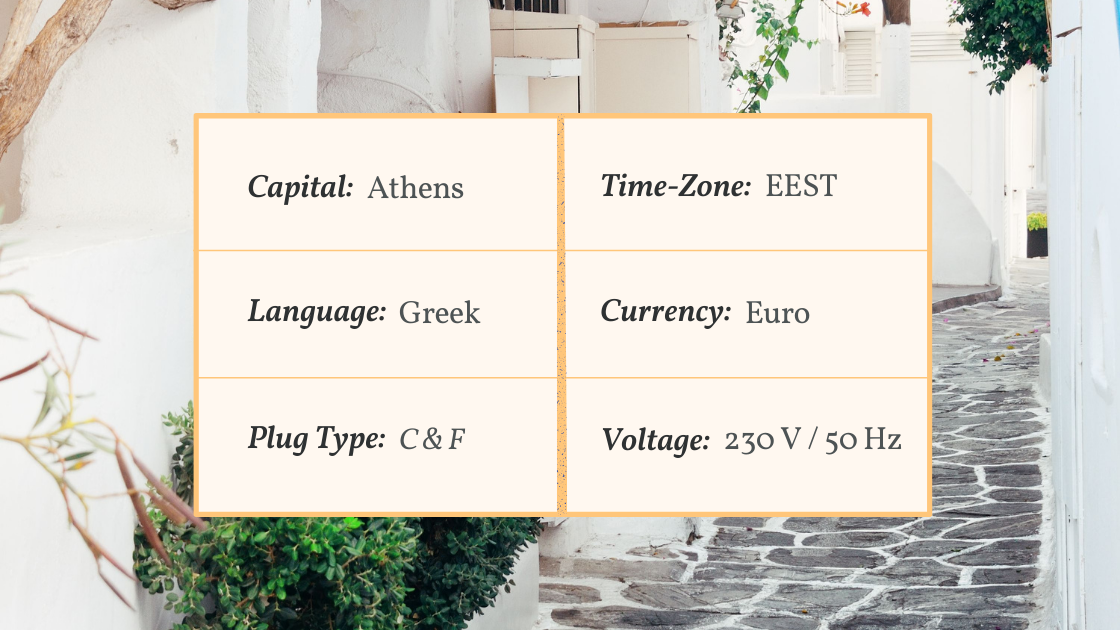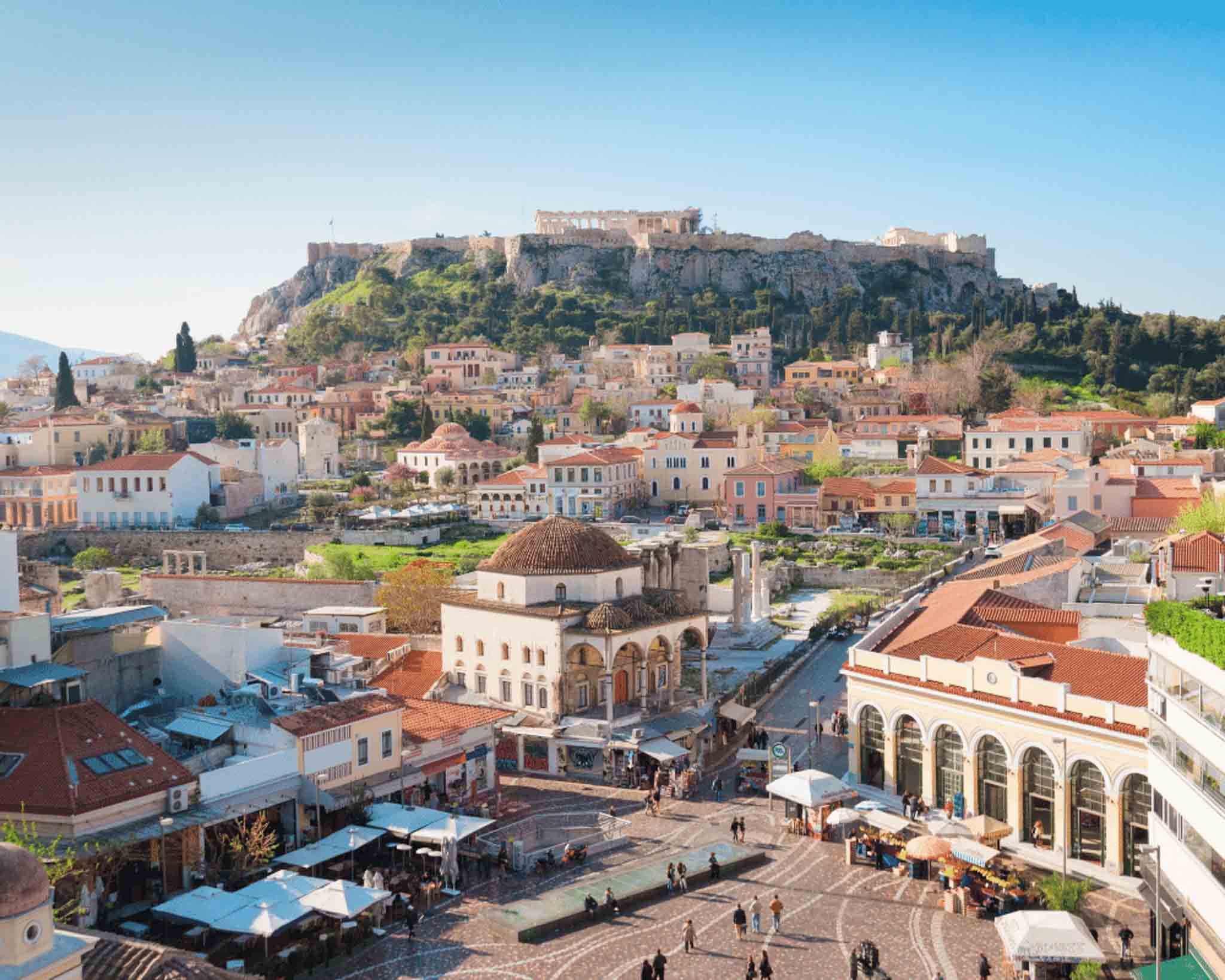15 Things You Must Know Before Travelling to Greece
Greece has everything you could possibly want from a dream destination.
Ancient history, incredible sights, great weather and food to die for, what more can you ask!
Still, an informed traveller is a happy traveller, so we’ve put together a list of 15 points that helped us plan our trip to this incredible country, and that we’re sure will help you plan your adventure as well.
1) Do Greeks speak English?
English is widely spoken and understood throughout Greece, so no need to learn a whole new language.
However, as with any foreign country you’ll visit, learning a couple of basic words is sure to make the locals more open to you, and will surely put a smile on their faces!
To help you prepare for your trip to Greece, we have prepared a free PDF will all the basics you’ll need. Download it from the link below, so you can take it with you on your travels and remember these simple terms.
No e-mail or personal information is required, you just need to press the button below!
↓
2) Do you need cash in Greece?
Accepting cards is now mandatory for all businesses, but generally the preferred method of payment throughout Greece remains cash. Some smaller businesses might not even accept card payments despite the law, so it’s always a good idea to have some euros on you.
Also, keep in mind that many islands have few or no ATMs, so be sure to pick up some cash before you hop on the ferry!
3) Is it safe to drive in Greece?
Greeks have a bad, and not completely undeserved, reputation when it comes to dangerous driving.
Roads, especially in the major cities such as Athens and Thessaloniki, are a a chaotic combination of cars crossing red lights, pedestrians running for dear life and general road rage.
If you’re feeling brave you can give it a shot, but we suggest passing up on driving in Greece.
4) Is it easy to move around Greece?
Greece is not a huge country, so moving from one region to the other can be easily done.
The railway and bus networks are great, even if the train connections are a little limited, and there are ferries linking all major islands to the mainland.
And of course, the many airports in Greece make it possible to fly to various destinations throughout the country at a relatively low cost.
Renting a car is also an option, especially if you intend on visiting more remote locations in the countryside, but with ever increasing gas prices and the reputation the Greeks have for reckless driving you’re better off relying on public transport instead.
5) Should I visit Greece during the summer?
Greece is one of the most popular summer destinations in Europe, but we do not recommend travelling there during those months.
The temperatures can become unbearable, and peak season will also mean jacked-up prices and over crowded locations.
We suggest booking your vacations either between the end of April until the end of May or in September. Temperatures will be milder, and out of the high season you’ll find lower prices and less crowds. September in particular is our favourite time to visit Greece, and we really recommend it!
Just keep in mind that some businesses only open during the high season, but the sights remain open all year long.
6) Are there public toilets in Greece?
Public restrooms are available around most main tourist attractions, as well as in many cafés and restaurants.
They are mostly not free though, another reason to have a few coins with you.
Keep in mind that sewer systems in Greece are a little outdated and rely on smaller pipes, so in most places you’ll see signs warning you not to throw paper into the toilets to avoid clogging.
7) How fast are services in Greece?
Ordered food and drinks? They’ll get there when they get there.
Called a taxi? It’ll get there when it gets there.
Waiting for the bus? It’ll.. well, you get the point.
The Greeks love taking their time for essentially any activity, and everything happens in its own time. So there’s no use getting upset, just arm yourself with a lot of patience and goodwill.
8) Is Greece disabled-friendly?
Unfortunately, Greece is not very disabled friendly.
Many towns and villages are perched on top of hills, with steep streets and stairs that are very difficult to traverse for anyone with difficulties, and impossible on a wheelchair.
The islands can also be tricky if you are mobility-impaired, as many don’t even have paved roads.
However, in recent years, many communities have made efforts to improve their infrastructure: Among the ones you should be able to visit are Corfu, Crete and Rhodes.
9) Is Greece safe to visit?
Greece is a very safe country. From time to time you might hear of protests that end in clashes with the police, but these are usually not a concern for visitors.
The main thing you need to be careful with is not getting your wallet stolen, as pickpockets are a constant threat, especially around tourist hotspots.
Travelling to Greece as a solo female traveller is also absolutely safe. The negative stereotype of being “too friendly” that is often still associated with Southern European men has died out years ago, but you should of course still practice common sense to avoid any unwanted attention.
10) Is tap water drinkable in Greece?
Tap water is drinkable in all of mainland Greece, unless specifically indicated.
However, if you have ever travelled to the islands, you’ll know that on some you’ll be straight up warned not to drink tap water. Some Airbnb’s we’ve stayed at even left bottled water for us to enjoy during the stay.
The reason is that some islands lack a fresh water source, and have their supplies brought in from the mainland via cargo ships. This can sometimes result in the water getting contaminated, so always be cautious and ask your host if in doubt.
11) On which days do shops close in Greece?
Essential businesses, such as supermarkets and mini-shops, are open all week long, while most other businesses will close on Sunday. Don’t worry though, most museums and tourist sights, like the Acropolis of Athens, remain open!
12) What footwear should I use while in Greece?
A good pair of breathable sneakers will get you through the Greek cobblestone roads without any trouble and, if you’re worried about the heat, a good pair of sandals can easily double for beach wear!
What you should avoid, instead, is heels and flip-flops.
Walking with heels on the uneven terrain will result in a quick and painful meeting with the floor, not to mention that they are straight up banned from being worn in and around archaeological sites because of the damage they can cause to the ancient floors.
Considering that the terrain in Greece goes up and down like a rollercoaster, and that you’ll definitely be walking for hours on end if you really want to enjoy all the country has to offer, we would keep flip-flops for the beach.
13) Do Greek Orthodox churches have a dress code?
If you’re planning on visiting the beautiful Orthodox churches and monasteries, keep in mind that there is a dress code in place for both men and women.
You’ll be expected to dress modestly, with clothes that cover both the chest, shoulders and knees. Especially during the summer, we would recommend bringing a light scarf so that you can dress lightly but still cover up when entering a place of worship.
14) Can you find gluten-free, vegan or vegetarian food options in Greece?
Greek cuisine is extremely varied, so there really is an option for everyone. Tourist hotspots will often have vegetarian and vegan options listed aside for convenience.
We found that the staff in most establishments were extremely open and friendly regarding any dietary options or restrictions, and were more than happy to help.
When it comes to celiac disease, many restaurants still struggle to understand the seriousness of the condition, as Greece is one of the countries in Europe where it is least prevalent. If you are affected, try your best to explain it to the staff so you don’t run into any misunderstandings.
15) Are there any hand gestures to avoid in Greece?
Much like Italians, there are dozens of gestures that the Greeks use to emphasise a point they’re making, or as a direct communication. Of all of those, there is one you must do your best to avoid!
It is called the Moutza, and it consists of extending your arm towards someone with your palm forward and your fingers spread.
It is considered an extremely offensive gesture, not unlike giving someone the middle finger, but because it is similar to many people’s way of saying “hi” you might find yourself doing accidentally.
Unless you wish to start a fight with a stranger on the street, we suggest not waving at anyone!
So, those are 15 things that we believe every traveller should know before visiting Greece.
Hopefully these points help you plan your travel, and to enjoy all this amazing destination has to offer.
Until next time, keep on travelling!
Ana & Luca
Did you enjoy this article?
Feel free to save or pin this image so that you can always look back on this blog post!
















Looking for the best views the city of Lisbon has to offer? When we think of Lisbon, the first thing that comes to mind is the beautiful views you can enjoy from its many hills. Combine that with a food and drink culture that is hard to beat and the result is obvious..